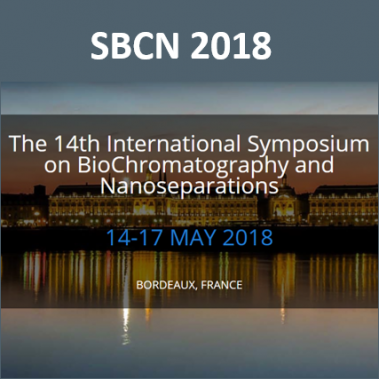News
- Home
- News & informations
- SBCN 2018 - 14th International Symposium on BioChromatography and Nanoseparations
SBCN 2018 - 14th International Symposium on BioChromatography and Nanoseparations
Bordeaux, 14th-17th May 2018
- by Ypso-Facto
- April 23, 2018
Laurent David will lecture at SBCN on:
"A Rational Approach for Comparing Different Affinity Chromatographic Processes for the Capture of Monoclonal Antibodies."
When looking at the wide range of chromatographic media and the multiple options to use them, the downstream process developer is nowadays confronted to an ever-growing number of possibilities. Among the different alternatives, one can think of using particles, or membranes, place the chromatographic particles in a stirred reactor, in a packed or in an expanded bed, the column can then be used in batch mode, or, more and more popular, connected to others to allow for continuous production, operations can be parallelized or continuous counter-current...
Developing, optimizing and then comparing all the possible options is tedious to say the least, if not impossible. An alternative is to perform a limited number of well-defined experiments, use them to extract relevant information, and then make use of process simulation to better characterize and understand different suitable processes to finally take educated decisions.
Process simulation requires the knowledge of physico-chemical parameters characterizing the adsorption, mass transfer and hydrodynamics of the system that can be performed at laboratory scale. These physico-chemical parameters are then used in computer modeling tools like ChromWorksTM [i], enabling to predict front propagations inside chromatographic column(s) and evaluate quantitatively the influence of operating parameters. This allows simulating single-column or more complex multi-column (MCC) systems just like a Lego game.
Using the example of a monoclonal antibody captured on affinity chromatographic medium, we propose an approach to assess standard single column systems, and new innovative multi-column systems like the BioSMBTM, the Sequential Multi-Column Chromatography (SMCC-BioSCTM), the 3 or 4 Column Periodic Counter Current System (3C-PCCTM or 4C-PCCTM) or the CaptureSMB.
We show that simple experiments allow to gather the required information to set up a chromatographic model, and to characterize the performance of each system in terms of purity, recovery, productivity and buffer consumption.
This should be the first step to select suitable candidates, which deliver reproducible and defined quality attributes, are scalable and persistent, matching regulatory expectations and allowing high productivity while keeping operational costs and capital expenditure low.
[i] Chromworks™, A software for chromatographic separations, Ypso-Facto, Nancy, France
Learn more on the event on the conference website.
Recent news

Ypso-Facto is a service company helping industrial firms to develop, optimize and secure their chemical processes and bioprocesses.
Download
Contact Us
-
Address: 19 avenue Foch
54000 NANCY - FRANCE - Phone: +33(0) 355 961 650
- Email: contact@ypso-facto.com

